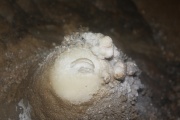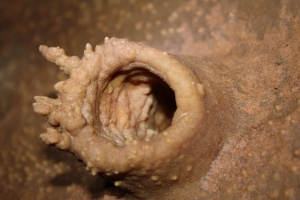Karren (Inventory)/Drip pit, carbonate
From LagWiki
(A bit more) |
|||
| Line 13: | Line 13: | ||
*[[Calcite (Inventory)/Conulite|Conulite]] | *[[Calcite (Inventory)/Conulite|Conulite]] | ||
*[[Calcite (Inventory)/Pearl|Pearl]] | *[[Calcite (Inventory)/Pearl|Pearl]] | ||
| + | |||
| + | ==Drip pit, carbonate, Karren== | ||
| + | <gallery perrow=1 widths=300px heights=200px> | ||
| + | File:Drip pit.JPG|Drip pit | ||
| + | </gallery> | ||
{{Cave inventory}} | {{Cave inventory}} | ||
[[Category:Needs references]] | [[Category:Needs references]] | ||
Revision as of 01:18, 21 November 2013
The Drip pit, carbonate field should be used to record any observation of a drip pit except for those in gypsum which has its own field.
A drip pit is a depression or hollow which is formed from dripping water. It can appear as a shallow depression in almost any floor material especially soft materials like guano, sediments like mud or gravel and moonmilk; but they can also form in harder carbonate materials like flowstone or stalagmites or directly in the bedrock.
Drip pits can vary in size from small depressions to deep, hollow, drill holes. Drip pits can be lined with calcite (see drip pit lining) which is one of the stages in forming a conulite. They may or may not be filled with water and can possess a cave pearl at the bottom.
Examine the floor and any shelves which may exhibit drip pits.
See also
Drip pit, carbonate, Karren


